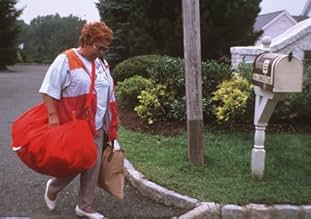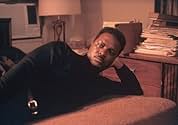La universidad y el instituto sirven de telón de fondo a dos historias sobre disfunciones y turbulencias personales.La universidad y el instituto sirven de telón de fondo a dos historias sobre disfunciones y turbulencias personales.La universidad y el instituto sirven de telón de fondo a dos historias sobre disfunciones y turbulencias personales.
- Dirección
- Guionista
- Elenco
- Premios
- 1 nominación en total
- Ethan (segment "Fiction")
- (as Steven Rosen)
- Dirección
- Guionista
- Todo el elenco y el equipo
- Producción, taquilla y más en IMDbPro
Opiniones destacadas
The first 30 minutes of the film focus on a creative writing student (Selma Blair) who's having a hard time finding inspiration. After breaking up with her disabled boyfriend, she had a fling with her African American professor and uses the experience as a basis for her next story.
The rest of the film is about a failed actor (Paul Giametti) turned documentarian who decides to make a high school slacker and his family the focus of his next project. It becomes obvious that the documentarian is the stand in for Solondz himself and he gets to answer the critics who call his work mean spirited or like a freak show where he's making fun of his subjects.
In classic Solondz tradition, there are tons of moments you'll feel bad for laughing at, but you won't feel too bad, because this is one of his best works and it's not as if he's not telling the truth.
Sadly though, I find it hard to convince certain TYPES of people as to why Solondz's work is so good. I try to tell them the writing is award-winning and beyond most failed attempts at culture critique. I try and tell them how good the performances are. I even try and point out some fantastic themes out of the multitude available in his work. But these certain types, they just can't seem to get it.
But on the bright side, the one thing that does give me a boast about Storytelling is Conan O'Brien. Now, it's not the fact that he's here, but how he fits in, it's like there are people out there that do NOT understand Conan or his humor at all, they just don't get HIM altogether. Then there are those, such as myself, that completely understand Conan and all his self-deprecation. How can you not love a character like Scooby that wants to be Conan's sidekick??? Is this NOT the dream of every self-deprecating teenager and college student?!? Being able to simple make that point in a film, as Solondz does so perfectly during that scene with Scooby and Conan, right after the proverbial gay pseudo blow-job, is something most auteur's can't ever GET AT. This is why it's depressing watching the film, you see how brilliant this man is and how clearly he can speak his mind and say to you: "I hear YOU, I feel this way, and I know you do too, and this is here for US to enjoy, not just something for everyone." Some people say Art is something everyone can universally appreciate. Others say it is completely subjective. I think it can in fact be both ways. You can look at Storytelling or actually Happiness is better for this as formulaic, or formal art, the technical way the film is put together is brilliant, that's its universal art. The thematics, the way the auteur says what's directly on his mind in a way that a certain kind of person is immediately able to grasp a hold of firmly, that's the other kind, the subjective kind. This man understands communication, let alone life, like very very VERY few writers and directors ever have and ever will.
The first part, called "Fiction", is significantly shorter than part two, "Non-fiction". This is as it should be, but the best would be to exclude it completely. The story about emotional tension between a college girl with ambition to become a writer, her frustrated CP boyfriend and their impressive/monstrous teacher, the successful writer, is just as conventional as the stories the students write in the film. This may be intentional, to cause multiple layers of meta-effects, but it doesn't save this part of the movie from being pretty predictable and boring.
And the story ends before it should. A sort of coitus interruptus (if the term is allowed), which demands some kind of return or closing-up later on in the movie - but there is none. I got the strong impression that this part was only included to make the movie full-time.
The second story, "Non-fiction", is clearly stronger, and told with much more passion from the writer/director. Here, many facets are explored, the characters are complex, the drama intricate - and the tension builds, right below the drab suburban surface. It is impressive how elements common in just about any family life, here add to the suspense and the sense of doom. The thrill of trivial life, but not at all trivially portrayed.
This might be the reason for the title "Non-fiction", since the lives and fates shown in the story feel so real - contrary to what happens in "Fiction".
Still, this story, too, has been told insufficiently, as if abbreviated, or halted at points where it was about to erupt into infernal drama. Pity. Did Solondz retreat from his own vision? Did he censor himself to get more of a general audience?
I hope that it's not the case. His portrayal of human life, although unpleasant indeed, is fascinating and uniquely his. So he must be true to it.
The film has two parts. The first part, titled Fiction, focuses on a creative writing student Vi (Selma Blair), her Cerebral Palsy-stricken boyfriend Marcus (Leo Fitzpatrick) and their professor Mr. Scott (Robert Wisdom).
The classroom setting provides an unusual venue: a story writing workshop within a story. Solondz puts one of the characters through a perversely traumatic experience, which we witness as viewers of the movie. Before we have a chance to pass judgment on Solondz, his character writes about the event in the 3rd person and reads the story in class. All accusations one might level against Solondz (namely: bad taste, plus every "ism" in the book) get made by the fellow students, who detest the story. But in the context of the movie, they're condemning an account of an event that actually happened! Very clever...
In spite of some of the grotesque twists, I found myself laughing out loud fairly often. Solondz has a gift for rendering subtle ironies that become overwhelmingly funny.
The lead characters are fascinating and multi-layered. Vi seems innocent, but if you pay close attention, you'll notice she's not particularly sincere. One would like to root for Marcus, but his condition doesn't excuse him for being a lousy writer and a self-absorbed a**hole. The professor may be a monster, but he is also very frank.
The second part Nonfiction is also highly self-aware. It covers the making of a two-bit documentary. In the process, the dialog once again anticipates many of the charges some will make against Solondz (that he exploits his subjects and creates a sensational freak show for us to snicker at). There's a cameo role with Mike Schank, who was featured in real life in American Movie. The similarities between the documentary American Movie, the fiction Storytelling and the documentary within a fiction (tentatively titled American Scooby) are uncanny.
Scooby (Mark Weber) is the ultimate apathetic suburban slacker teen. While very much spoiled and sheltered, he is also alienated from, and resentful of, his elders. He perks up a bit when there are no grownups around, but most of the time the "stupid" barrier is up and his eyes are half-closed and red from smoking pot. He's such a lost cause, he attracts the attention of an aspiring documentarian (Paul Giamatti).
As you might expect, the rest of Scooby's family is a real piece of work. Scooby's dad (John Goodman) is loud and domineering. His mom (Julie Hagerty) is idiotic. His younger brother Brady (Noah Fleiss) is a jock, perhaps the closest to what we'd like to consider "normal".
The brainy youngest brother, Mikey (Jonathan Osser) is a real standout. He tags around with the overworked El Salvadorian housemaid Consuelo (Lupe Ontiveros) and asks her lots of questions. His curiosity is cute, but his conceited insensitivity truly boggles the mind.
Solondz definitely favors the sordid, but I'm not sure he does so gratuitously. I think he simply refuses to pretend, as so many other do, that the world is a tidy, simple place. (Those who seek to preserve such a notion are guaranteed to abhor his work.) But is it fair to berate Solondz just because he dares to present what others systematically avoid? Whose vision is more skewed: Solondz for pointing out the dog***t on our shoes, or the mainstream for ignoring it?
I wish I could agree that his writings are contrived and distorted, but I don't think they are. Through the media, through the grapevine and sometimes with my own eyes, I've seen events that are every bit as twisted and "wrong" as those Solondz creates. Everywhere I look, I encounter people who could easily be incorporated into a Solondz script.
Every storyteller recreates the world according to his/her own vision. Todd Solondz just happens to be vastly more perceptive and talented than most. Storytelling is one of the most insightful, clever and thought-provoking films I've ever seen. Watch it multiple times for maximum yield.
¿Sabías que…?
- TriviaThere was a third story, with James Van Der Beek as a college student realizing his sexuality, which was subsequently cut out of the film.
- ErroresThe positions of Scooby's hands when he is holding the gun change between shots.
- Citas
Catherine: It was confessional, yet dishonest. Jane pretends to be horrified by the sexuality that she in fact fetishizes. She subsumes herself to the myth of black male potency, but then doesn't follow through. She thinks she 'respects Afro-Americans,' she thinks they're 'cool,' 'exotic,' what a notch he 'd make in her belt, but, of course, it all comes down to mandingo cliché, and he calls her on it. In classic racist tradition she demonizes, then runs for cover. But then, how could she behave otherwise? She's just a spoiled suburban white girl with a Benneton rainbow complex. It's just my opinion, and what do I know... but I think it's a callow piece of writing.
- Versiones alternativasThe original version of the film featured a third story entitled "Autobiography", concerning, among other things, a closeted football player (James van der Beek). The main character has an explicit gay sex scene with a male partner (Steven Rosen); the entire story was cut from the final version.
- ConexionesFeatured in This Film Is Not Yet Rated (2006)
- Bandas sonorasFiction
Performed by Nathan Larson and Nina Persson
Written by Nathan Larson and Nina Persson
Published by The Music Of NATO and Stockholm Songs
Nathan Larson appears courtesy of Artemis Records
Nina Persson appears courtesy of Stockholm Records
Selecciones populares
- How long is Storytelling?Con tecnología de Alexa
Detalles
- Fecha de lanzamiento
- País de origen
- Sitio oficial
- Idiomas
- También se conoce como
- Storytelling
- Locaciones de filmación
- Productoras
- Ver más créditos de la compañía en IMDbPro
Taquilla
- Total en EE. UU. y Canadá
- USD 921,445
- Fin de semana de estreno en EE. UU. y Canadá
- USD 73,688
- 27 ene 2002
- Total a nivel mundial
- USD 1,318,945
- Tiempo de ejecución1 hora 27 minutos
- Color
- Mezcla de sonido
Contribuir a esta página










































